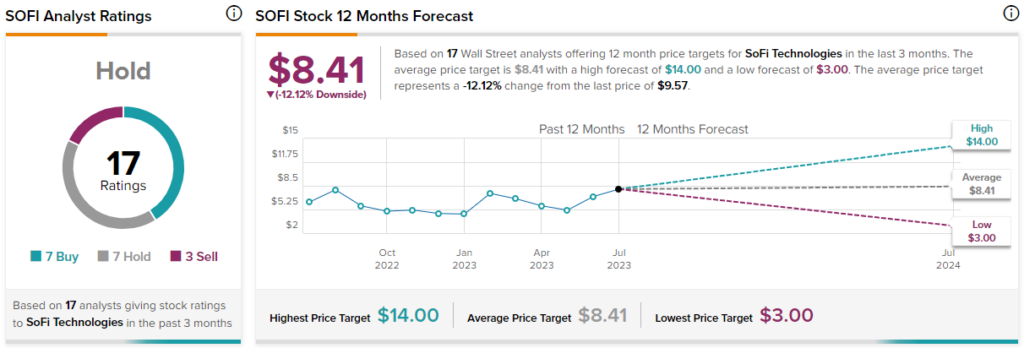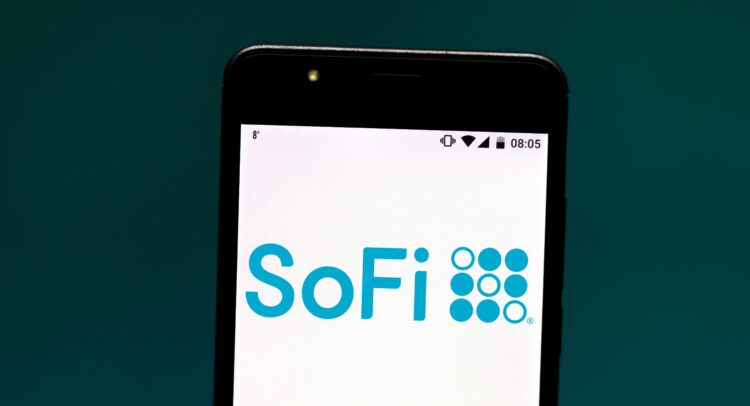SoFi Technologies, Inc. (NASDAQ:SOFI), an online personal finance company, is widely considered a big winner of the expected resumption of student loan repayments. However, the company’s path to profitability remains uncertain, a risk that must be monitored carefully. SoFi stock has gained 110% this year amid the improving sentiment toward growth stocks, making investing in SoFi a risky bet today. I am neutral on the prospects for SoFi as I believe most of the positive impact from the resumption of student loan repayments has already been priced in.
Elevate Your Investing Strategy:
- Take advantage of TipRanks Premium at 50% off! Unlock powerful investing tools, advanced data, and expert analyst insights to help you invest with confidence.

Mixed Expectations for SoFi
SoFi was established in 2011 with a mission to revolutionize the private student loan industry by offering low-cost refinancing options for borrowers. Since then, the company has expanded to offer several other credit products, such as home loans, personal loans, and credit cards. Today, the company conducts business in three categories — Lending, Technology Platform, and Financial Services. The student loan refinancing business remains one of the company’s core products. As of March 31, student loans accounted for over a third of SoFi’s loan portfolio, with a value of $5.2 billion.
The U.S. Department of Education launched a relief program in 2020 to pause student loan repayments. As part of the debt ceiling deal agreed on a couple of months ago, the Department of Education was prohibited from extending the student loan repayment pause. Therefore, loan repayments will begin in September this year. The Biden Administration’s efforts to launch a one-time student debt forgiveness program were also blocked by the Supreme Court last month, paving the way for SoFi to grow the loan refinancing business.
In 2022, SoFi’s student loan originations declined by a staggering 48% year-over-year to $2.2 billion. For context, in 2019, SoFi reported $6.7 billion in student loan originations, which shows the massive hit to this business segment resulting from the loan repayment pause. Given that SoFi has a stronghold in the student loan refinancing market, the company is certain to see a meaningful uptick in student loan originations starting from September as borrowers begin servicing debt.
There is, however, another side to the argument as well. With the student debt repayment pause and record-low interest rates, many borrowers accumulated other types of debt in the last two years, including personal loans, credit card debt, and even mortgages. Pressured by the challenging macroeconomic environment, these borrowers are now finding it difficult to keep up with the repayment of these loans.
According to data published by the Consumer Financial Protection Bureau, 7.1% of student loan borrowers are already behind on the repayment of other debt. Although SoFi will benefit from the resumption of repayments, the company may find it difficult to maintain growth in the student loan business in light of the credit challenges faced by its target group of customers.
The AI Advantage
SoFi, as one of the nation’s leading online financial services companies, has been quick to embrace artificial intelligence (AI) to offer a more streamlined experience to its existing and potential customers. The company has improved the loan underwriting process using AI and is actively using the technology to offer customers personalized solutions and competitive rates.
Galileo Financial Technologies, a company owned by SoFi, recently launched Cyberbank Konecta, a conversational AI engine that helps financial services companies to create AI-powered digital experiences for their customers.
This product is aimed at increasing customer engagement and reducing human-customer interactions, and it’s an innovative product through which SoFi is deploying AI technology to diversify into new revenue streams. In addition to using AI to innovate with products, the company is using the technology to prevent fraudulent activities and monitor security threats.
SoFi, as a Fintech company that has thrived for well over a decade, has built a reputation among U.S. consumers as a high-tech platform. By leveraging AI technology, the company is likely to pose a major threat to established banking giants in the next decade.
Is SoFi Stock a Buy, According to Analysts?
SoFi stock, until the beginning of June, was trading well below $5, but the stock is close to $10 today, with investors betting that the company will benefit from the resumption of student loan repayments. These recent gains have prompted analysts to take a cautious stance.
On July 13, Morgan Stanley (NYSE:MS) analyst Jeffrey Adelson downgraded SoFi, suggesting the company should be valued similarly to a bank because of its recent diversification efforts. JPMorgan (NYSE:JPM) analyst Reginald Smith, on the other hand, believes SoFi may not be as big a winner of the resumption of student loan repayments as expected by the market.
Based on the ratings of 17 Wall Street analysts, the stock comes in as a Hold, and the average SoFi Technologies price target is $8.41, which implies downside risk of 12.1%.

Despite stellar revenue growth, SoFi is yet to be profitable. With recession risks looming on the horizon, SoFi’s lending business may take a hit in the coming quarters, pushing the company further away from profitability. Investing in an unprofitable company at stretched valuation levels during times of economic uncertainty carries substantial risks.
The Takeaway: SoFi is a Risky Bet
SoFi’s student loan business is on the verge of making a strong comeback. However, the recent surge in SoFi stock price has pushed the company into the fairly-valued territory, creating an unfavorable risk-reward profile. The company enjoys a long runway for growth, but investors will have to keep an eye on valuation before jumping on board.
















